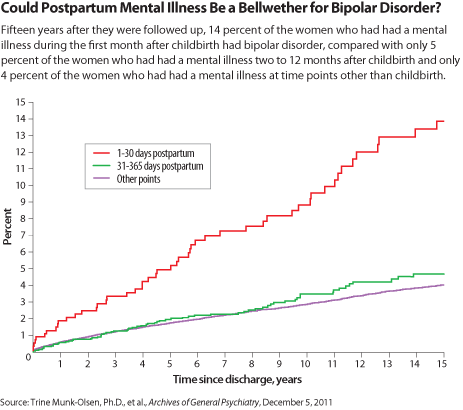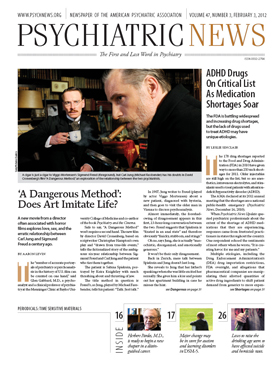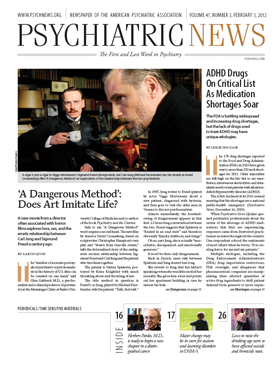When a woman experiences a psychiatric illness for the first time after giving birth, it raises the possibility of underlying bipolarity, a large Danish study suggests.
The study was headed by Trine Munk-Olsen, Ph.D., an associate professor of psychiatry at Aarhus University in Denmark, with findings published December 5, 2011, in the Archives of General Psychiatry.
Munk-Olsen and her colleagues used Danish population registers that included the entire Danish population to obtain subjects for their study. The cohort was 120,378 women with an initial psychiatric disorder other than bipolar disorder. The women were followed for 15 years to determine whether any of them were diagnosed with bipolar disorder.
During that period, 3,062 received a bipolar diagnosis, 132 of whom developed their initial psychiatric illness anywhere between immediately after birth and 12 months after delivery. The researchers then used these findings to see whether the women who had had their initial psychiatric illness within one month after childbirth were more likely to have bipolar disorder than the women who had had their initial psychiatric illness at other points in time.
Almost 14 percent of the women whose first psychiatric illness occurred during the first month after childbirth turned out to have bipolar disorder, compared with 5 percent of women who had had an initial psychiatric illness two to 12 months after childbirth and 4 percent who had had an initial psychiatric illness at other time points.
Yet since only 14 percent of the women who had had their first psychiatric disorder within one month after childbirth eventually received a bipolar diagnosis, doesn’t this suggest that the chances are actually quite small that such women are at risk for developing bipolar disorder?
“Looking at the raw numbers might indicate that the chances that these women are bipolar are small,” Munk-Olsen explained to Psychiatric News. “However, it is important to highlight that bipolar disorder is a rare disorder and, most importantly, compared to women with onset at other time points, women with first psychiatric episodes within the first postpartum month were around three times more likely to convert to a bipolar diagnosis. This indicates a large difference in conversion rates between the three groups we studied— women with immediate postpartum episodes, women with later postpartum episodes, and women with nonpostpartum episodes.”
Also of interest, postpartum subjects who required hospitalization for their initial psychiatric illness were twice as likely to have bipolar disorder as those who had not been hospitalized for their illness.
“The results of this study clearly demonstrate that a postpartum onset [of an initial psychiatric illness] raises the possibility of underlying bipolarity,” the researchers concluded. “The Mood Disorder Questionnaire was recently shown to be a useful screening instrument for bipolar disorder in the postpartum period, and there are other screening tools (both semistructured interviews and self-report measures) for bipolar disorder in general that can be used following childbirth.”
The study was funded by the Danish Medical Research Council, the Stanley Medical Research Institute, and the U.S. National Institutes of Health.


